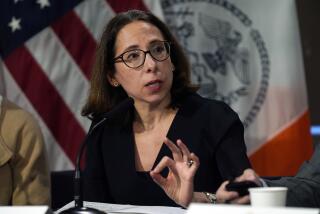Lawyer on fast track derailed
WASHINGTON — Three years ago, D. Kyle Sampson took some time off as a top Bush administration lawyer to try his first and only criminal case. It was a federal drug prosecution in South Florida, where the defendant also was cited as a felon with a firearm.
Earlier, as a junior lawyer in a Salt Lake City law firm, Sampson assisted in a “handful” of civil cases, usually taking a second chair to more seasoned trial attorneys.
It doesn’t seem like the sort of resume that would propel a lawyer into the national limelight.
On Thursday, Sampson was thrust into the glare of the widening scandal over the firing of eight top federal prosecutors. For seven hours before the Senate Judiciary Committee, most of them angry Democrats, the man still fairly new to Washington strove to defend his role in orchestrating the firings.
“Really,” he said, looking back on his brief career as a lawyer, “through serendipity I’ve had opportunities for other public service in the government. And I believe in public service, and in all of my work in public service, I’ve made every effort to operate openly and forthrightly and with integrity.”
A month ago, few even knew his name.
He was born in 1969 in Cedar City, Utah, a devout Mormon who later served in a mission for Hmong refugees in Minnesota. He graduated from Brigham Young University in 1993, moving on to study with honors at the University of Chicago Law School. He briefly clerked for a federal appeals court in Richmond, Va., then returned to Utah and joined a Salt Lake City law firm.
Friends suggested he broaden his experience, so he took a post in Washington as counsel to Sen. Orrin G. Hatch (R-Utah) in 1999.
Two years later, when President Bush moved into the White House, Sampson again turned to friends. Elizabeth Cheney, daughter of the incoming vice president and a former law school classmate, helped him get a spot in the White House Counsel’s office. In 2003, he was appointed counselor to then-Atty. Gen. John Ashcroft.
When Alberto R. Gonzales, who had been Sampson’s boss at the White House, became attorney general in 2005, Sampson was elevated to deputy chief of staff at the Justice Department. A year later, he was chief of staff -- a climber with good connections, one able to operate below the political radar.
“He played a role like the quarterback,” said Washington lawyer Noel Francisco, a friend from Sampson’s time at the White House and Justice Department. “He was a coordinator of the information, but the decision making was by consensus.”
On Thursday, Sampson portrayed himself as a back-bencher. “I was a keeper of the list,” he said about the fired U.S. attorneys, describing his paperwork stashed haphazardly in the lower right drawer of his desk at work..
He was, he said, “the aggregator of information,” who took recommendations and data from others deciding which prosecutors had to go.
But he also glided deftly among the Republican influential. He played point guard in pickup basketball games with Ashcroft, and on long trips with his boss he jumped at opportunities to discuss religion and politics.
“Like me,” he once told the Salt Lake Tribune, “Ashcroft thinks those are the two most interesting things to talk about.”
Sampson resigned earlier this month, when the scandal began to threaten Gonzales.
He left as chains of his old e-mails were made public, showing he routinely discussed whom to fire with White House and Justice Department officials, and how to duck for political cover.
Hatch came to his defense at Thursday’s session.
“You’ve made some mistakes,” his old mentor told him. “But we all make mistakes.... And you shouldn’t be pilloried just because the administration decided it was time to make a change.”
Others were unimpressed. Sen. Charles E. Schumer (D-N.Y.) seemed almost dumbstruck at how little experience Sampson had accumulated before coming to Washington, and how quickly he obtained a series of top jobs.
“It’s a pretty severe indictment of the Justice Department in which you served,” he admonished Sampson, who sat stoically.
Sampson shook Schumer’s hand when the hearing ended. Then he left the room.
He might return eventually to Utah with his wife, Noelle, and their three children, but not as the U.S. attorney in Salt Lake City, as he had once imagined. Like the eight top lawyers he had helped fire, his time was up.
Times staff writer David G. Savage contributed to this report.
More to Read
Get the L.A. Times Politics newsletter
Deeply reported insights into legislation, politics and policy from Sacramento, Washington and beyond. In your inbox three times per week.
You may occasionally receive promotional content from the Los Angeles Times.











